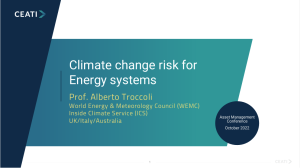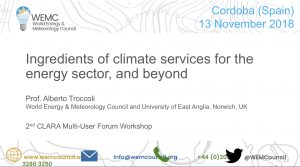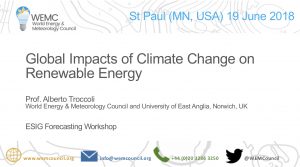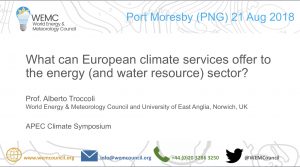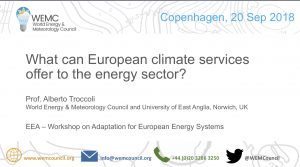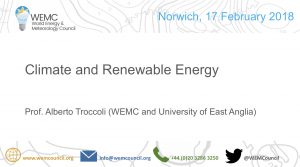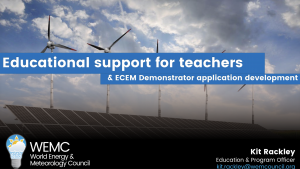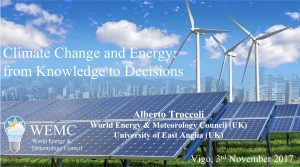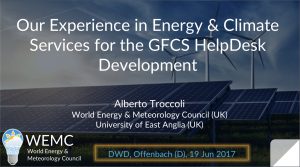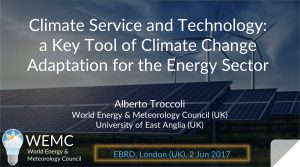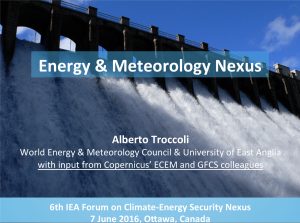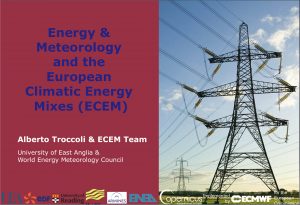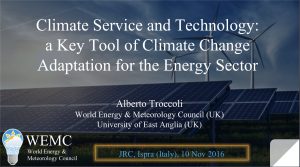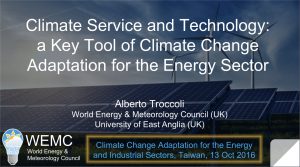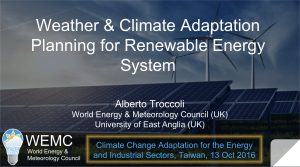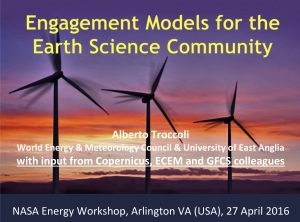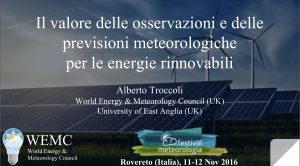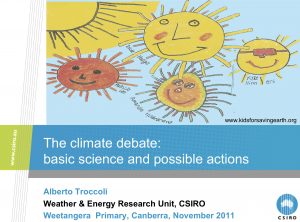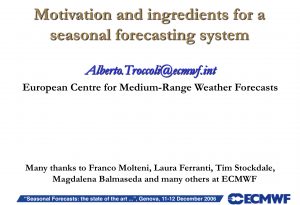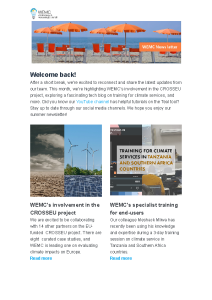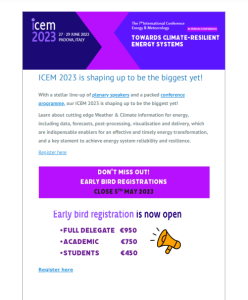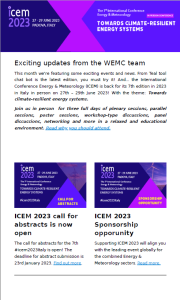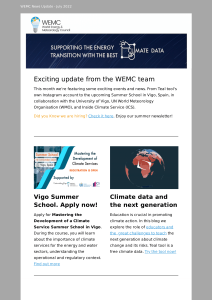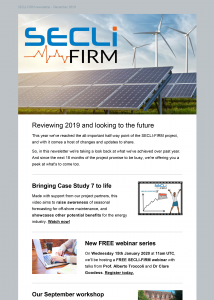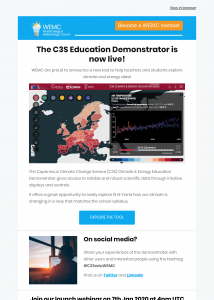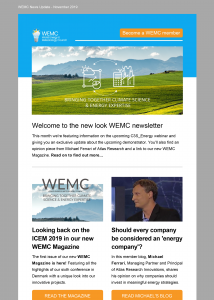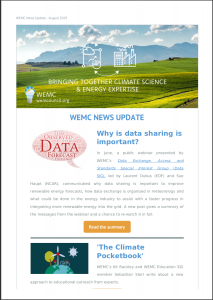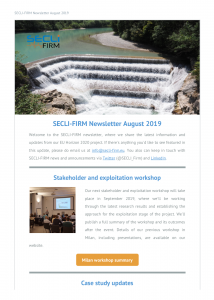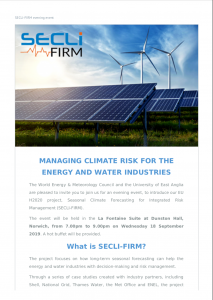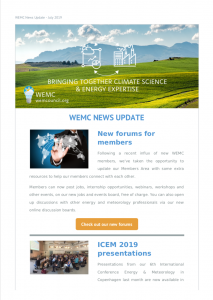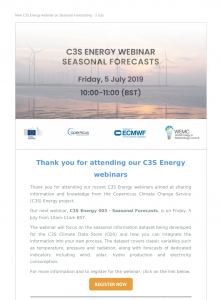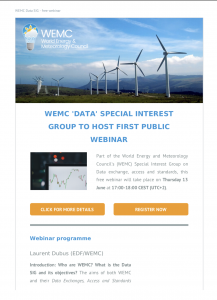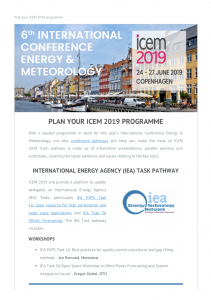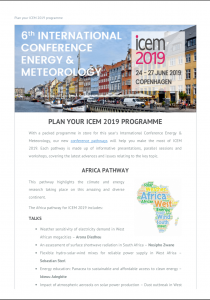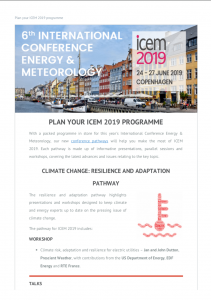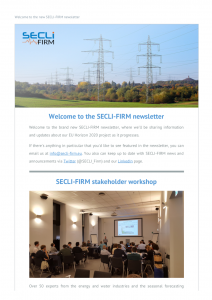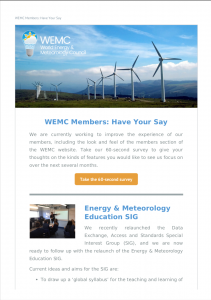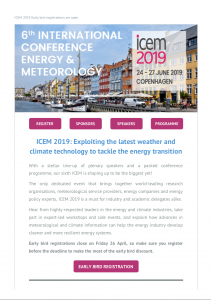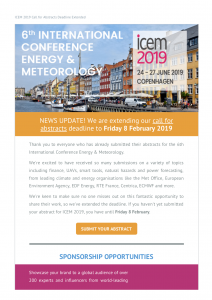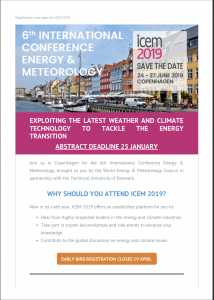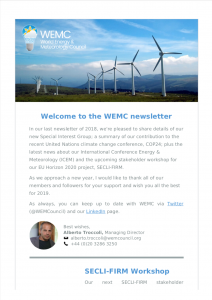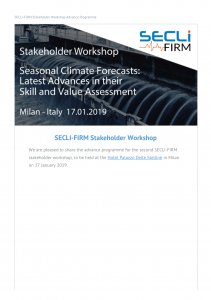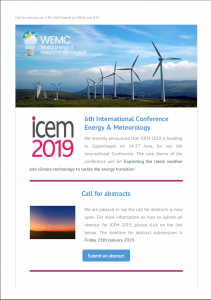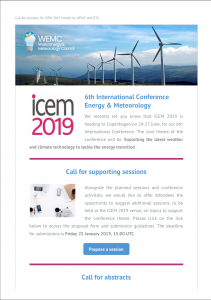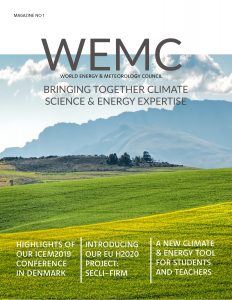Books
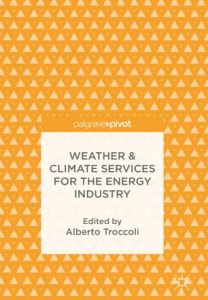
Weather & Climate Services for the Energy Industry
Edited by Professor Alberto Troccoli
This open access book considers the lessons learned in establishing an ongoing discussion between the energy industry and the meteorological community and how its principles and practises can be applied elsewhere.
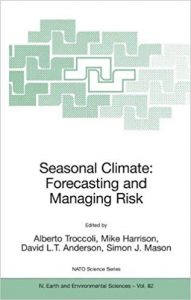
Seasonal Climate: Forecasting and Managing Risk
Edited by Professor Alberto Troccoli, Mike Harrison, David L. T. Anderson and Simon J. Mason
Originally formed around a set of lectures presented at a NATO Advanced Study Institute (ASI), this book explores the fascination of seasonal climate forecasting, for which El Niño forecasting provides the prime basis.
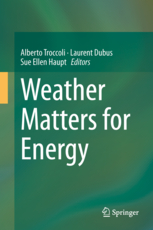
Weather Matters for Energy
Edited by Professor Alberto Troccoli, Laurent Dubus and Sue Ellen Haupt
This book provides the meteorological knowledge and tools to improve the risk management of energy industry decisions, ranging from the long term finance and engineering planning assessments to the short term operational measures for scheduling and maintenance.
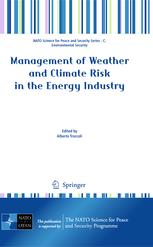
Management of Weather and Climate Risk in the Energy Industry
Edited by Professor Alberto Troccoli
This book shows how to identify the potential impacts of extreme meteorological event precisely and assess the probability of their occurrence. This can only be done through an enhanced dialogue between the energy community and the climate and meteorology community.
Presentations
Click to download PDF
Newsletter Archive
Click to download PDF
- July 2024
- March 2023
- December 2022
- July 2022
- February 2020
- December 2019
- December 2019
- November 2019
- November 2019
- 29 August 2019
- 8 August 2010
- 19 July 2019
- 18 July 2019
- 25 June 2019
- 30 May 2019
- 24 May 2019
- 22 May 2019
- 16 May 2019
- 13 May 2019
- 1 May 2019
- 25 April 2019
- 15 April 2019
- 10 April 2019
- 8 April 2019
- 22 February 2019
- 28 January 2019
- 14 January 2019
- 21 December 2018
- 4 December 2018
- 16 November 2018
- 5 November 2018
- 29 October 2018
Magazine Archive
Click to download PDF
- Issue No.1
Podcasts from MoneyVista
The following podcasts were recorded by Mr Ian Harper, a journalist and curator of the MoneyVista’s Business of Weather Podcast. Ian most recently interviewed Dr. Alberto Troccoli in 2020 as well as keynote speakers and WEMC directors at ICEM 2017 on various energy and meteorology topics, and continues to explore and expose innovations in the market today.
You can find out more about Ian and his series of podcasts here.
The first two podcasts are part of the WeatherPod series, published and co-hosted by Alan Thorpe, former Director General of the European Centre for Medium Range Weather Forecasts (ECMWF), and David Rogers, former CEO of the UK Met Office and lead meteorological consultant at the World Bank and Global Facility for Disaster Reduction & Recovery (GFDRR).
The WeatherPod explores how weather and climate information is produced, made available and used, and the key role of national and international co-operation in addressing the mounting challenges to life, society and business from extreme weather and climate change.
The WeatherPod is available to stream and download from the Global Weather Enterprise Forum website, via ACAST and also Apple iTunes.
 Energy and Meteorology
Energy and Meteorology
In this podcast episode, recorded in 2021, Alan and David talk with Dr. Alberto Troccoli about the importance of weather data products in ensuring continuity of supply, as more of our energy requirements are met by renewables.
 Economics of Weather Information
Economics of Weather Information
Hosts David Rogers and Alan Thorpe meet Thomas Frei to explore the economics of weather information, the increasing sensitivity of business and society to the weather, and the evolving roles of the sectors in the global weather enterprise.
Energy, Weather and Climate Change
In this new interview, recorded in 2020, Ian talks to Dr. Alberto Troccoli of the World Energy & Meteorology Council about the importance of weather data to increasing the use of renewable energy and in enhancing energy efficiency.
Listen now >

The Energy Meteorology Market
In this interview, Ian interviews Dr Charlie Smith and Dr. Steve Dorling about the business opportunities of applying meteorology in the energy sector, especially for business start-ups and Small or Medium Enterprises.

The European Climatic Energy Mixes (ECEM) Demonstrator Project
In this interview, Ian interviews Dr. Laurent Dubus of EDF and Prof. Alberto Troccoli about the aims and objectives of the European Climatic Energy Mixes (ECEM) Demonstrator Project.

Opportunities for SMEs in Energy Meteorology
In this interview, Ian interviews Mr Giles Dickson and Dr. Steve Dorling about the business opportunities of applying meteorology in the energy sector, especially for business start-ups and Small or Medium Enterprises.

Increasingly accurate weather forecasting and what it means
In this interview, Ian interviews Dr. Florence Rabier, Dr Andrea Steiner, Dr Sue Ellen Haupt, and Dr Jonas von Schumann about the increasing accuracy of weather forecasting and what it means for such areas as renewable energy, climate change projection, etc.
Roberta Boscolo – World Meteorological Organisation (WMO)
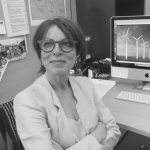
How important do you think the availability of climate science is for the energy sector today?
It is widely recognized by society that climate variability and change is threatening their businesses, property and lives. The Paris Agreement, in 2015, represented a historical milestone towards collective actions to mitigate the impacts of climate change and adapt to it. Decision-makers including water providers, policy-makers, offshore wind companies, insurance and many more, need climate information to guide their actions more than ever before. The energy sector currently accounts for more than two thirds of global greenhouse gas (GHG) emissions and its transformation to a low-carbon future brings a fundamental and comprehensive change in the way energy is generated, with exploitation of renewable sources being central to this global effort. Generation of and operational planning for renewable energy are strongly affected by weather and climate, which cause wide variations in both energy supply and demand. Therefore, energy sector stakeholders need to have access to climate information to become more resilient to extreme weather and to accelerate the transition to a greener and more efficient energy system. The Global Framework for Climate Services (GFCS) initiative, which is spearheaded by the World Meteorological Organization (WMO), coordinates efforts by the United Nations, governments and organizations to develop science-based climate information for various climate-sensitive sectors, including energy. GFCS seeks to incorporate climate information and predictions into socio-economic planning, policy and practice.
What are the barriers to the energy sector gaining and using this information?
The energy sector stakeholders, among other socio-economic sector stakeholders, are rather advanced in the use of weather and climate information for their planning and operations. Nevertheless, several challenges exist for the weather climate information providers to meet the data requirements of the energy sectors users. One major barrier is the lack of products and services that are customer-driven in terms of accuracy, frequency of delivery and location specific. Such gap is currently hindering the integration of weather and climate information in the energy sector business and decision-making. For this reason, the GFCS included as one of its main components the User Interface Platform (UIP) to facilitate the continuing technical and scientific interaction between weather and climate services providers and users to co-develop and co-produce products and tools in support of decision-making. Last year GFCS published a roadmap for developing user-friendly climate services that can contribute to the development of renewable energy as well as a more climate resilient and efficient energy industry. The document can be downloaded here: http://www.wmo.int/gfcs/sites/default/files/Priority-Areas/Energy/GFCS_Energy%20Exemplar_JN17453.pdf
What are the WMO’s hopes for energy sector and meteorology collaboration?
WMO is one of the United Nations specialized agencies that provides world leadership and expertise in international cooperation in the delivery and use of high-quality, authoritative weather, climate, hydrological and environmental services by its state Members, for the improvement of the well-being of societies of all nations. One of the key priorities of WMO is the implementation of climate services worldwide for five socio-economic areas: health, disaster risk reduction, water, food security and energy. For example, at country level WMO is encouraging regular communication between energy and meteorological specialists to collect requirements for improved, or new, meteorological and climate products and services. Wind energy production in particular requires improved climate predictions that better estimate the changes in wind speed for upcoming seasons, years and decades. This is critical for anticipating wind-energy supplies, which, in turn, is needed to facilitate the large-scale integration of wind energy into the broader energy supply system. Through a rising demand for new services by the renewable energy sector, WMO hopes to enhance the capacity of the National Meteorological and Hydrological Services (NMHSs) to deliver better forecasts quality products and more location/user specific and targeted forecasts outputs. These products together with an increased sharing of data and best practices at regional and global level would enable the development of renewable energy systems and assist countries to achieve the Sustainable Development Goals and their Nationally Determined Contributions to the Paris Climate Change Agreement.
How will the MOU help achieve this?
The World Energy and Meteorology Council (WEMC) is a WMO key partner for the implementation of climate services for the renewable energy sector. WMO and WEMC have already collaborated in the publication of the GFCS roadmap for the energy priority area, previously mentioned, and have organized a successful training course in Norwich, UK, in July 2016. Now, with the formalization of the partnership thorough the signing of the Memorandum of Understanding, both organizations commit to work together for the implementation of the Global Climate Services for Energy (GCSE) program. GCSE aims to provide robust, scientifically validated and energy tailored climate-based products to advise energy operators, planners and policy makers to improve investment decisions for planning and operations of energy systems and to achieve an effective integration of renewable energy for a safe, reliable, more accessible and cleaner energy supply in developing countries. The project focuses on achieving improved climate-related energy outcomes in a set of participating countries (Tanzania, Colombia, Peru, Papua New Guinea, Burkina Faso and Moldova) by providing, on the one hand, the required technical support for the project implementation and, on the other hand, by developing ways for up scaling the tools, methods, lessons and results obtained in these countries on a worldwide basis. This year we are also planning to organize an updated version of the training course held in 2016. The 2018 course will be held in Shanghai, China, just prior the ICEM Conference. Registration are open, hurry up (https://www.wemcouncil.org/wp/event/training-course-on-climate-and-energy-2018/)
What role do you think renewable sources of energy have to play in 2018 and beyond?
Decarbonisation of the world’s energy system must become a common vision for governments and all the other stakeholders for achieving the Sustainable Development Goals and the Paris Agreement limiting-temperature targets. Governments will need urgently to increase the use of low-carbon technologies, like renewable energy, in all the economic sectors and increase investment in research and innovation of new technologies in clean energy generation. These measures are essential also to accelerate the global access to a more secure, affordable, decarbonised and climate resilient global energy system with combined and aligned development and climate targets. Such transition requires enabling policy framework to facilitate the development of renewable energy and to provide long-term stability for private investments in renewables. The time between now and 2030 is critical to achieve the long-term goals of the Paris Agreement towards climate neutral and resilient economy and society in the second half of this century. Transformation of the energy system in line with the Paris Agreement temperature limit is technically possible but will require around 70% of the global energy supply mix in 2050 to be generated by low-carbon energy systems. The largest share of the emissions reduction potential from now to 2050 is coming from renewables and energy efficiency. Achieving such potential will require a significant modernization of the electricity grids to ensure minimum losses and maximum flexibility in electricity systems to integrate large shares of variable renewable generation, including the role of storage. Financial support, technology development and transfer, as well as capacity-building are essential to enable action at scale in developing countries where successful planning, climate change mitigation and measures to foster sustainable development require large investments.
– February 2018

